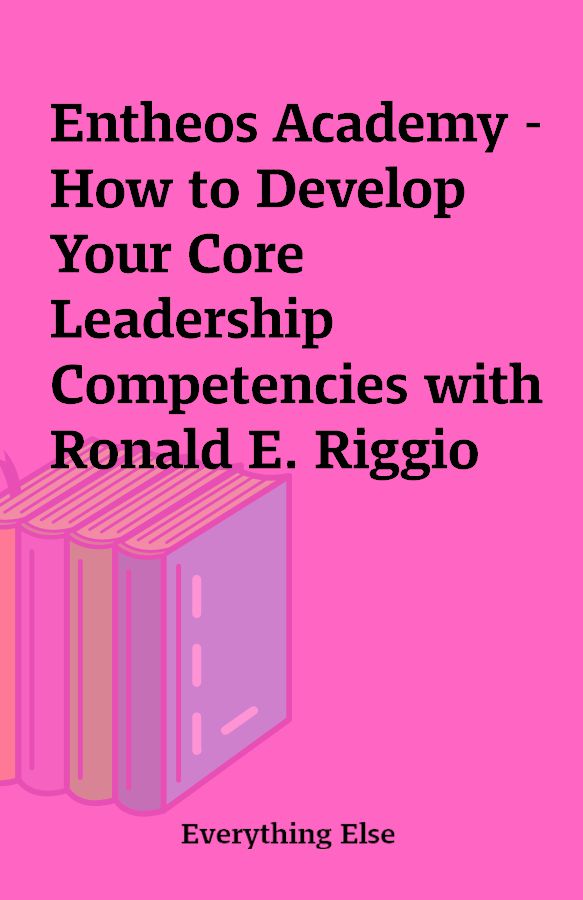Entheos Academy – How to Develop Your Core Leadership Competencies with Ronald E. Riggio
How to Develop Your Core Leadership Competencies.mp4
[WebRip – 1 MP4]
Description
Your ProfessorRonald Riggio, PhD, is the author of over 100 books, book chapters and research articles in the areas of leadership, assessment centers, organizational psychology and social psychology.Class OverviewFor over 100 years, social scientists have studied leadership and what makes leaders effective. As a result, we know the critical leadership competencies that can make you a successful leader.How to Develop Your Core Leadership CompetenciesFor over 100 years, social scientists have studied leadership and what makes leaders effective. As a result, we know the critical leadership competencies that can make you a successful leader.Here are the ten steps to developing your core leadership competencies.The Top 10 Big Ideas 1 Engage Your Motivation to Develop Some people willingly accept responsibility, while others shun it. Likewise, in order to become a top-rate leader, you must have the motivation and drive to develop. We use the term “developmental readiness.” What that means is: are you ready to work hard to develop your leadership competencies? Are you able to take constructive criticism in an effort to improve? Are you willing to give up old, ineffective strategies and try new ones? If you answered “yes” to all of these questions, you have the motivation to develop your leadership competencies. 2 Assess Your Current Strengths and Developmental Needs All developmental programs need a starting point. We begin with an assessment of your current strengths and areas that need improvement. Engage in self-reflection. What are you good at? What needs work? You can also get feedback about your leadership strengths and developmental needs by asking coworkers – the persons you supervise, your peers, your superiors. In organizations, getting feedback from all “directions” is referred to 360-degree feedback, and is an important part of most leader development programs. The advantage is that you can gain insights from those around you who see you in different roles and from different perspectives. 3 The Core Competencies Leaders Most Often Need As I mentioned, leadership has been studied for more than a century. We know which competencies leaders need to be effective. In brief, you need to be smart, be emotionally savvy, and have the right character to lead effectively. Each of these competencies can be developed, but all take hard work. We have learned a lot about what happens if you lack one area of the core competencies by studying failed leadership. Sometimes leaders just make bad decisions. Take former J.C. Penney CEO Ron Johnson. He made the decision to stop sales and discounts at the stores, ignoring the fact that shoppers love sales, and without doing any marketing research. Sometimes leaders fail because they lack empathy and lose follower support. Take Yahoo CEO Marissa Mayer who abruptly cancelled all working from home arrangements for employees. All employees now had to come into the office without exception. She neglected to take into account special employee circumstances such as childcare issues and the trend toward telecommuting. The backlash from employees made national news. It is important to note that research shows that leaders learn more from their failures than their successes.Here are the 3 areas of core competencies leaders need to develop: 4 Develop Cognitive and Social Skills Effective leaders need to be smart. That doesn’t mean that you have to have a super high IQ, but it does mean that you need to know what you are doing, and how to make the right decisions. Learn about your business and about your work team. Learn how to collect and analyze data to inform decisions. Be “socially intelligent,” by learning to be tactful in communications, and seeing things from others’ perspectives. Learn how to solicit valuable information from your work team, from peers, and from mentors. 5 Develop Emotional Skills It’s not enough to be just smart. A good leader also needs to be emotionally intelligent. Emotional intelligence is the ability to read others’ emotions – to know when they are happy or disgusted with what you are saying or doing. It is also about learning to control your own emotional expressions – to not act out in anger and to keep your stress under control. 6 Develop Character Leaders can be smart and competent, but it all goes for naught if the leader lacks the ability to do the right thing. Character is critically important for keeping a leader on the right path. A well-proven model for leader character development is to focus on the 4 cardinal virtues: Justice = being fair in your treatment of others; Temperance = regulating your emotions and passions; Prudence = being wise and considering others’ points of view; Fortitude, or Courage = having the courage to do the right thing, taking calculated risks, and be willing to put your career on the line rather than doing something unethical. 7 Set Good Developmental Goals Regardless of the competencies that you are trying to develop, it is important to set good developmental goals. The acronym SMART is the guideline for goal setting. Goals need to be: Specific – know exactly what competency you are targeting for development; Measurable – figure out how to assess improvement; Attainable – don’t set goals that are so high that you will get frustrated; Realistic – likewise, don’t make goals too easy so that there is no challenge involved; Timely – Set a specific timeframe for developing the leadership competency. 8 Get Feedback It is critically important that you receive feedback throughout the competency development process. Having a mentor or coach who will give you honest and constructive feedback is one strategy. Pairing up with a partner-peer who is also working on leadership development will allow you to give each other feedback. Another strategy is to ask your direct reports if they have noticed improvement. Use mistakes as a learning tool to further develop your leadership competencies. 9 Reward Progress As I said, leadership development is hard work. Therefore, it is very important that you take time out to reward yourself for improvement. Celebrate even the small “wins” and improvements. 10 Continuous Improvement Developing leadership competencies is not a one-time event. It is a continuous program of improvement. Remember, leadership is a journey, not a destination.
You must be logged in to post a review.






Reviews
There are no reviews yet.